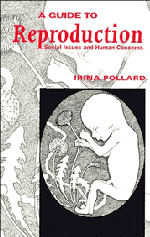Book contents
- Frontmatter
- Contents
- Preface and acknowledgements
- Part one Reproductive biology
- Part two Reproduction and social issues
- 13 Population dynamics, stress and the general theory of adaptation
- 14 Extinctions and the conservation of endangered species
- 15 Artificial control of fertility
- 16 Hormonal contributions to errors of sexual differentiation
- 17 The acquired immunodeficiency syndrome (AIDS) epidemic: a global emergency
- 18 The effect of nutrition and exercise on the hypothalamic–pituitary–gonadal axis
- 19 Principles of teratology and an update on nicotine, ethanol and caffeine abuse
- 20 Ethical aspects of human reproductive biology
- Index
20 - Ethical aspects of human reproductive biology
Published online by Cambridge University Press: 05 June 2012
- Frontmatter
- Contents
- Preface and acknowledgements
- Part one Reproductive biology
- Part two Reproduction and social issues
- 13 Population dynamics, stress and the general theory of adaptation
- 14 Extinctions and the conservation of endangered species
- 15 Artificial control of fertility
- 16 Hormonal contributions to errors of sexual differentiation
- 17 The acquired immunodeficiency syndrome (AIDS) epidemic: a global emergency
- 18 The effect of nutrition and exercise on the hypothalamic–pituitary–gonadal axis
- 19 Principles of teratology and an update on nicotine, ethanol and caffeine abuse
- 20 Ethical aspects of human reproductive biology
- Index
Summary
Rapidly evolving and complex new reproductive technologies have given hope to the infertile and engendered much controversy and social change. The treatment of human infertility was revolutionized in 1978 with the world's first IVF baby and many technical advances quickly followed. In the 1990s, these improved skills are contributing to human welfare, opening up prospects for the conservation of endangered species and upgrading animal production. Adaptations of the technologies central to controlling human fertility and infertility are also becoming central in the quest for increased food production and, together with advances in modern contraception, are a response to the worst legacies of increasing human population pressures. Modern reproductive technologies have, by increasing our autonomy from biological constraints, irreversibly altered longheld cultural concepts surrounding fertility, childbearing and child rearing. They have also raised many ethical issues.
The power of these newly developed reproductive technologies forces decisions in areas such as whether or not to prolong life and pain of a seriously ill infant, abort a supposedly defective fetus, use another person's gametes to create an embryo, or to use a surrogate to bear a child. We also often have to choose between the rights of the parents and those of the unborn child. The dilemmas created transcend the concerns of scientists, doctors, parents and other health carers and have become social issues with strong political and philosophical overtones. Decisions affecting the reproductive capacity of individuals, alternatives to neonatal intensive care and the consequences of prenatal testing and genetic counselling are made more difficult because they have to be made in the context of the same cost constraints that limit the application of all medical technologies.
- Type
- Chapter
- Information
- A Guide to ReproductionSocial Issues and Human Concerns, pp. 376 - 388Publisher: Cambridge University PressPrint publication year: 1994



